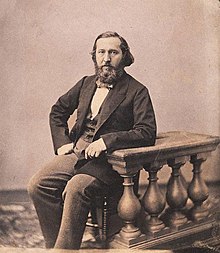Konstantin Sergejewitsch Aksakow
Konstantin Sergejewitsch Aksakow ( Russian Константин Сергеевич Аксаков ; * March 29th July / April 10th 1817 greg. In the village of Novo-Aksakow of the then Orenburg governorate ; † December 7th jul. / December 19, 1860 greg. On the Greek island Zakynthos greg ) was a Russian writer and, like his brother Ivan , an important representative of the Slavophiles .
Konstantin Sergejewitsch Aksakow was born as the son of the well-known writer Sergei Timofejewitsch Aksakow on his estate in the Orenburg governorate in the southern Ural region. From 1832 he studied at Moscow University . There he was significantly influenced by the philosophy , in particular by the view of history and culture, Georg Wilhelm Friedrich Hegel . In the 1840s he took the lead among Slavophiles, who saw the future of Russia in a return to accepted Slavic traditions, in contrast to Westerners , who were oriented towards the intellectual and cultural development of Western Europe.
In 1855, Aksakov formulated his political views in the memorandum "On Russia's Internal Condition" to Tsar Alexander II. In it he called for internal freedom in Russian society, which was organized in communities according to an assumed medieval ideal, without serfdom and with freedom of expression . In return, the tsar should retain full sovereignty and decision-making powers in all foreign policy issues. The tsarist government did not react to this with as severe persecution as it did to social revolutionary, anarchist or democratic aspirations based on the Western model, but it also spied intensely on Aksakov and his circle.
With Aksakov's death the socio-romantic tendencies of Slavophilia faded into the background and the movement became increasingly nationalistic .
Web links
| personal data | |
|---|---|
| SURNAME | Aksakow, Konstantin Sergejewitsch |
| ALTERNATIVE NAMES | Аксаков, Константин Сергеевич (Russian) |
| BRIEF DESCRIPTION | Russian writer |
| DATE OF BIRTH | April 10, 1817 |
| PLACE OF BIRTH | Novo-Aksakow, Orenburg Governorate |
| DATE OF DEATH | December 19, 1860 |
| Place of death | Zakynthos |
